As we transition into 2025, business requirements continue to change and evolve at an unforeseen pace.
Driven by relentless technological advancements, the adaptation to these changes is essential for any organization, company, brand or business that wishes to remain competitive in the modern market.
For instance, today's customers, with a plethora of information at their fingertips, have expectations that morph with the digital tide.
Meeting, if not exceeding, these expectations is essential to small business success.
Here, I discuss 16 pitfalls that companies often fall into, jeopardizing their performance, reputation, public perception, and ultimately their bottom line - and how you can avoid falling into these same traps.
Article Shortcuts:
- Ignoring Digital Transformation
- Neglecting Online Customer Engagement
- Inadequate Online Sales Channels
- Not Collecting and Analyzing Customer Feedback
- Failing to Address Website Performance Issues
- Lack of Mobile Optimization
- Ignoring Social Media Integration
- Neglecting Email Marketing
- Inadequate Customer Support Channels
- Not Utilizing Data Analytics
- Failing to Adapt to Market Changes
- Ingoring Cybersecurity Threats
- Inadequate Training on Digital Tools
- Failing to Maintain a Strong Online Reputation
- Ingoring Automation Opportunities
- Neglecting Accessibility

1. Ignoring Digital Transformation
Spending on digital transformation, or “the integration of digital technology into all areas of a company,” is expected to exceed $2.51 trillion in 2024 (nearly 300% more than in 2017).
Clearly, then, the global trend is towards digital transformation, thanks to its increased efficiency, productivity, and customer and work experience benefits.
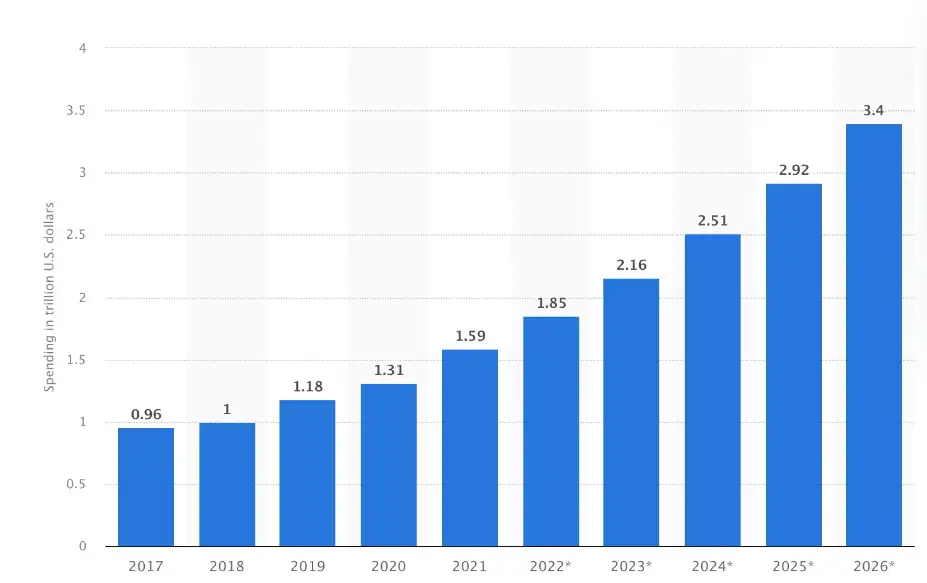
This means that any business that fails to adapt to the digital landscape and neglects to evolve its operating procedures to modern digitalized standards will be outperformed by other companies in the market.
From switching to cloud hosting, to remote-friendly, employee reskilling, and automated AI-driven insights, digital transformation needs to happen in all aspects of a company.
2. Neglecting Online Customer Engagement
Customer engagement, or the way a company creates a relationship with its audience, has become a central strategy for fostering business growth and loyalty in 2025.
As Henry Ford said, “It’s the customer who pays the wages,” so keeping customers engaged and happy is absolutely essential for any modern business.
The global market for customer engagement solutions (including, for example, the best customer engagement software for SaaS) is set to reach $27.45 billion next year. This size demonstrates just how important companies in the marketplace perceive the escalating focus on enhancing digital interactions.
Overlooking this vital facet can hinder a business’s rapport with its audience, consequently affecting customer retention and loyalty. It’s about delivering value across digital channels, whether through insightful content, prompt customer service, or engaging digital experiences.
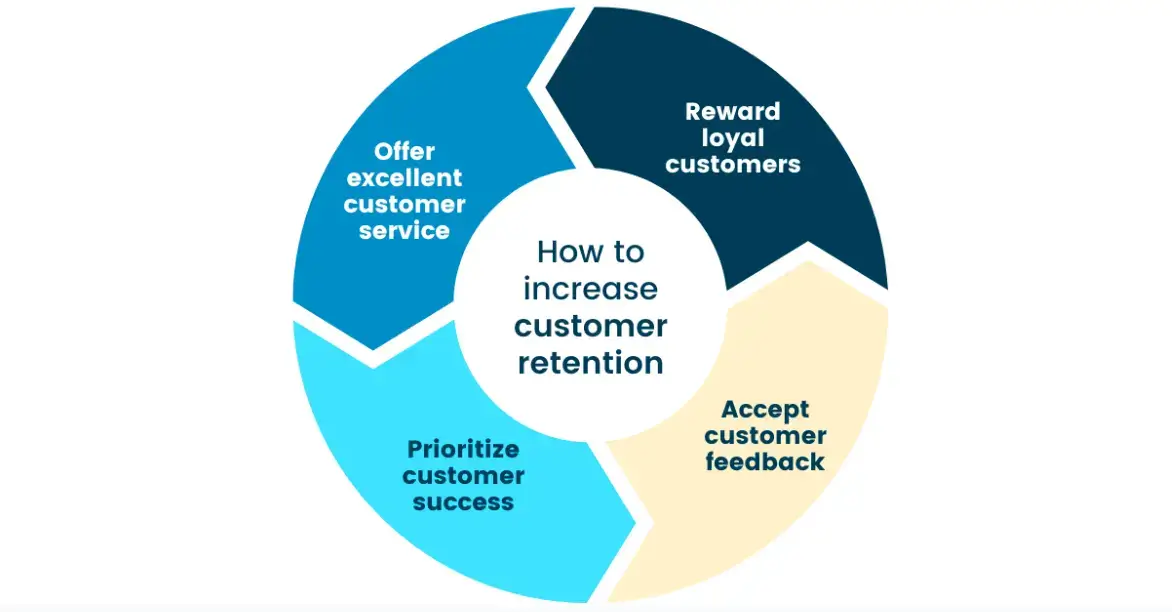
Source: Act
3. Inadequate Online Sales Channels
Online sales channels are avenues where businesses can offer their products or services to a digital audience. They encompass platforms like e-commerce websites, social media marketplaces, and online retail partners.
The leverage of online sales channels amplifies market reach, enables round-the-clock sales, and provides data-driven insights to refine sales strategies.
In a market where e-commerce sales are projected to reach $6.3 trillion by 2024, any company that fails to diversify its online sales channels is putting itself at risk.
A well-structured online sales channel not only caters to the convenience-seeking modern customer but also opens up avenues for global reach, unlike traditional brick-and-mortar setups.
An inadequate or poorly structured online sales channel can significantly hinder a company's revenue potential and customer reach.
A well-orchestrated online sales strategy is imperative, ensuring seamless navigation, a secure payment gateway, and an intuitive interface for customers.
4. Not Collecting and Analyzing Customer Feedback
Collecting and analyzing customer feedback is the compass for steering a business in the direction that meets customer satisfaction and expectations.
A staggering 89% of companies consider customer experience a key factor in driving customer loyalty and retention, underscoring the crucial role of feedback.
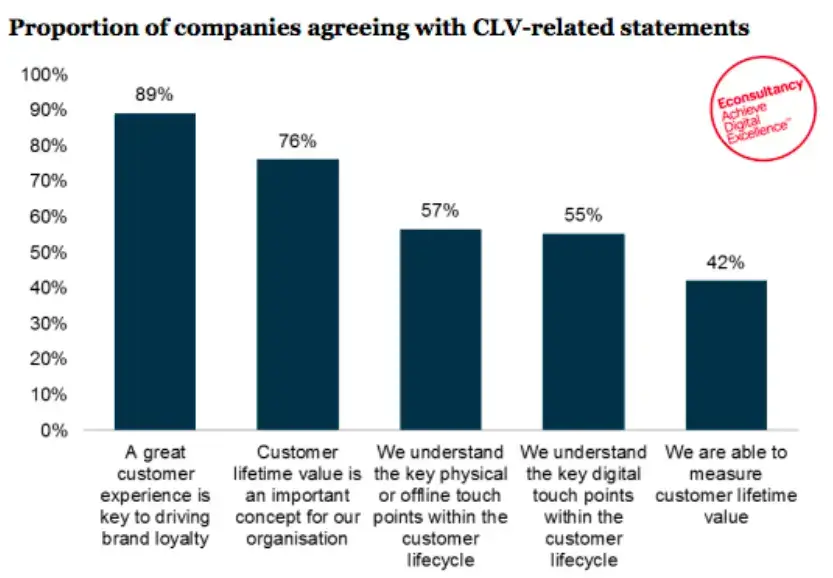
The importance of this feedback extends beyond mere data collection. It's a goldmine of insights that helps companies continually develop and improve where necessary, and double down in their areas of excellence.
Whether tweaking product features, improving user interface, or refining customer service protocols, customer feedback is invaluable to staying competitive in 2025.
5. Failing to Address Website Performance Issues
Your website serves as your business’s digital presence, so performance issues, such as slow page load times, unresponsive design, or frequent downtimes, can significantly damage a brand’s image and customer satisfaction.
Just a one-second delay in page load time can lead to a 7% loss in conversions, so website performance clearly directly impacts profitability and revenue.

Source: Uxpin
The ripple effect of poor website performance extends to search engine rankings as well.
Search engines like Google factor page speed and mobile responsiveness into their ranking algorithms, so performance issues could significantly hamper a website’s visibility in search results.
This, in turn, can compromise the number of online visitors and potential clients that company receives.
6. Lack of Mobile Optimization
Mobile optimization is no longer a luxury, but a necessity for businesses striving to capture and retain a digitally savvy audience.
The surging trend of mobile internet usage, with over 4.28 billion unique mobile internet users as of October 2021, underscores the imperative nature of mobile optimization.
Similar to website performance, mobile optimization’s impact also extends to search engine rankings.
With Google's mobile-first indexing, the search engine predominantly uses the mobile version of content to index and rank.
7. Ignoring Social Media Integration
The budget for social media marketing is expected to reach $56 billion in 2024, making social media platforms essential for brand engagement and a gateway to e-commerce sales.
With nearly 50% of young US internet users making purchases over social media, any company that fails to optimize its social media presence runs the risk of losing out to competition.
SEO and brand building are also significantly impacted by a robust social media presence, as profiles often secure top spots in search results for branded keywords, enhancing brand visibility.
While SEO still drives more traffic than organic social media, a balanced approach in utilizing both can significantly bolster a brand's online visibility and engagement rates.
Ignoring social media integration is a forfeited opportunity to connect with audiences and remain competitive in a digitally dominated market.
8. Neglecting Email Marketing
77% of marketers witnessed an uptick in email engagement over the previous year, and by the end of 2023, revenue from email marketing is projected to near $11 billion.
Moreover, a staggering 99% of email users are in the habit of checking their inboxes daily, with some doing so up to 20 times a day - figures that highlight the indispensable role of email marketing in maintaining a close-knit connection with customers, thereby fostering a loyal clientele.
Furthermore, email marketing boasts a remarkable return on investment (ROI), with brands raking in $36 for every dollar spent on email marketing.
This impressive ROI is complemented by consumers' preference for email as a digital channel for business communication, with 55% voicing this preference.
The cost-effectiveness of email marketing, coupled with its broad reach—evidenced by the daily exchange of 347.3 billion emails in 2023, which is set to escalate to 361.6 billion in 2024—makes it an unignorable asset for businesses striving for enduring customer relationships and a robust online presence.
9. Inadequate Customer Support Channels
The evolving expectations of the modern customer mean that any company that fails to deliver outstanding customer support will suffer greatly in the modern market.
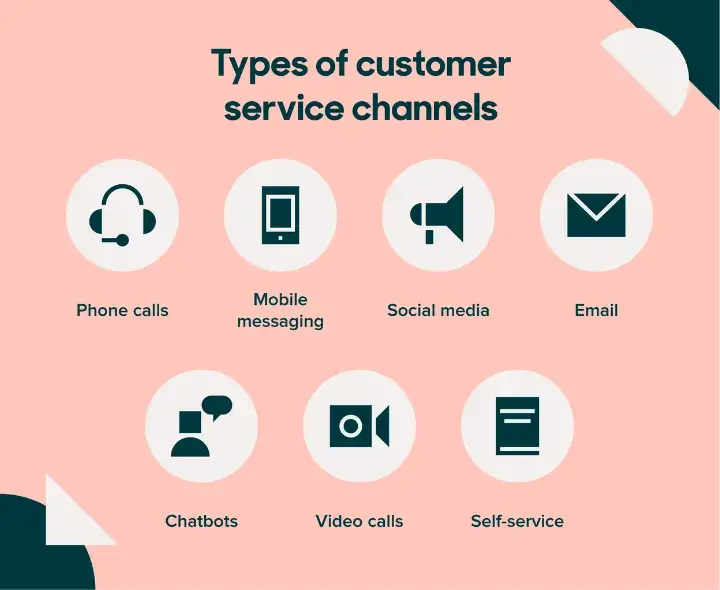
Source: Zendesk
Companies are recognizing that investments in customer service can yield substantial returns, prompting a trend of expanding customer support teams and training professional customer service agents.
Moreover, as discussed earlier, the advent of digital transformation has given rise to numerous technological advancements that are reshaping customer service approaches.
For example, the increased adoption of AI and automation is one of the omnichannel trends that businesses are expected to implement.
This trend empowers organizations to handle customer inquiries and repetitive tasks and provide 24/7 support through AI-powered chatbots and automated messaging, significantly augmenting the efficiency and effectiveness of customer service channels.
By acknowledging the importance of robust customer support channels and leveraging modern technologies to enhance customer service, businesses are better positioned to meet the demands of the contemporary market.
This leads to improved customer satisfaction and, ultimately, a stronger competitive presence in the industry.
10. Not Utilizing Data Analytics
Data analytics plays an indispensable role in facilitating informed decision-making within businesses.
The global market for advanced analytics is anticipated to grow from $248 billion in 2019 to $281 billion by 2024, indicating that more businesses than ever before recognize the significance of data analytics in their operations.
Importantly, organizations have identified “improved efficiency” and “more effective decision-making” as the primary benefits of employing data analytics.
This means business decisions can be made faster, with better direction and information, which helps companies react faster and stay ahead of their competitors.
11. Failing to Adapt to Market Changes
Past global events, such as wars, crypto bull runs, and pandemics, have shown just how fickle the modern business landscape is. As such, adapting to market changes in 2025 will be key for any business wanting to remain competitive.
To do this, companies must invest in remaining competitive and relevant by developing skills, adapting products, and experimenting with hybrid selling.
-
Investment in skill development
In response to evolving market dynamics, organizations are anticipated to escalate investments in nurturing essential skills like emotional intelligence, sales training, communication, and interpersonal abilities in 2025.
-
Agile product management
Agile methodologies enable swift assessment and adaptation to market alterations, facilitating a proactive approach in tweaking business strategies to resonate with consumer behavioral shifts.
-
Hybrid selling
Initially a reaction to the pandemic, hybrid selling is expected to become the predominant sales strategy by 2025, thanks to changing customer preferences and a shift towards remote-first engagements.
This strategy aligns with market changes and augments revenue by up to 50% by enabling extensive and profound customer interactions.
12. Ignoring Cybersecurity Threats
Ignoring cybersecurity threats could have devastating effects on a company's financial health and reputation.
Amid the myriad challenges businesses face, concerning cybersecurity threats showcases a pressing need to uphold stringent security measures. Inevitably, leveraging best cloud security practices is no longer optional but imperative for safeguarding digital assets against sophisticated cyber threats.
It’s estimated that by 2024, 50% of cybersecurity leaders will have unsuccessfully attempted to use cyber risk quantification to drive enterprise decision-making.
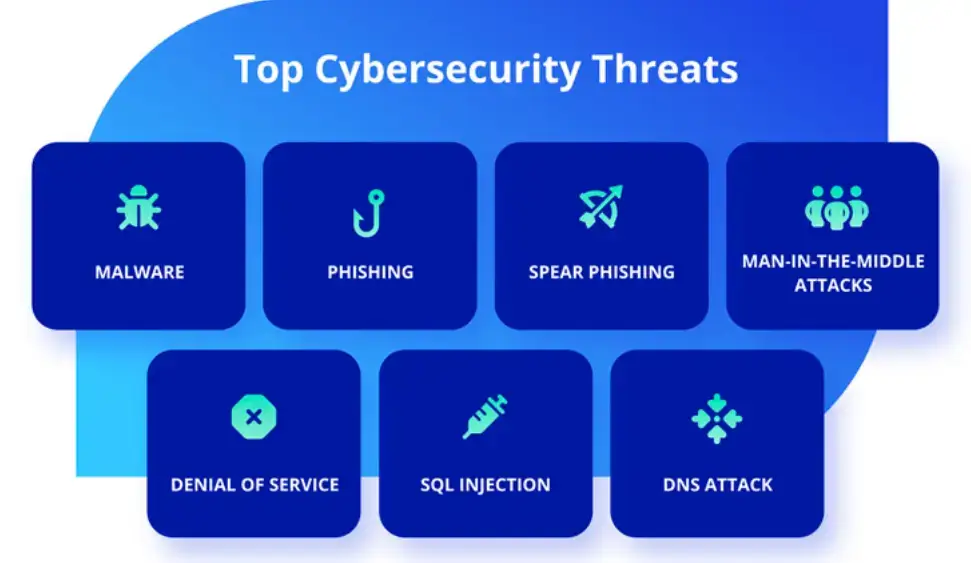
Source: RiskOptics
Furthermore, although 62% of businesses that adopted cybersecurity risk awareness state they experienced gains in “credibility and cyber risk awareness,” only 36% have achieved action-based results, demonstrating the importance of adopting the right cybersecurity measures.
Essentially, organizations that adopt a robust cybersecurity protocol are expected to reduce the financial impact of a security breach by an average of 90% by 2024. This shows, purely from a financial perspective, how beneficial investing in cybersecurity best practices is in the modern digital age.
13. Inadequate Training on Digital Tools
The rapid pace of development in digital tools provides both benefits and challenges for businesses.
These advancements offer improved efficiency, accuracy, and capabilities. However, they also require users to continuously learn and adapt. Inadequate training on these digital tools can lead to a range of issues:
- Reduced productivity: Without proper training, employees might not utilize the full potential of digital tools, leading to decreased productivity.
- Increased error rate: Lack of understanding may result in errors which could be costly and time-consuming to correct.
- Lower employee morale: Employees might feel overwhelmed or frustrated if they are expected to use unfamiliar tools.
- Security risks: Insufficient training might lead to misuse or misconfiguration of digital tools, posing security risks.
- Resource drain: Time and resources may be wasted troubleshooting issues that arise from incorrect tool use.
Thus, it’s imperative that any business wanting to remain competitive in the modern marketplace instill a company culture of ongoing employee upskilling and training to ensure that both employees and the company reap the benefits of the rapidly evolving number of tools and products available.
Read more about best SaaS tools.
14. Failing to Maintain a Strong Online Reputation
Online reputation management (ORM) is absolutely essential because the digital presence of a business is generally the first interaction that potential customers have with that company.
For instance, 85% of consumers trust online reviews as much as personal recommendations, and nearly three-quarters of consumers trust a company more if it has positive reviews.
Furthermore, 90% of consumers read online reviews before visiting a business, and these reviews impact nearly 70% of purchasing decisions.
What’s more, companies with a strong online presence can charge more for their products and services, with 86% of customers willing to pay more for services from a company with higher ratings and reviews.
If a business fails to manage its online reputation, it will not only miss an opportunity to increase revenue but also risk being tarnished by unfair and untrue reviews.
15. Ignoring Automation Opportunities
With 53% of businesses implementing automation in some form, every second business is missing out on the opportunity to enhance their processes, reduce human error, and alleviate stress in the workplace.
From remote payroll to marketing and decision-making, there are many facets of the modern business that can be automated to help them operate more efficiently and more profitably.
Similar to adopting digital transformation, failing to adopt automation opportunities will simply leave a business behind competitors.
16. Neglecting Accessibility
In the digital landscape of 2025, overlooking accessibility can lead to exclusion and legal issues. To avoid this pitfall:
Captions and Transcripts: Ensure your videos and podcasts have accurate captions and provide written transcripts. Riverside offers an effortless solution for adding captions.

Source: Dribble
Alt Text and Color Contrast: Use descriptive alt text for images and maintain good color contrast in designs to assist visually impaired users.
Keyboard Navigation: Make your website and tools navigable by keyboard alone.
Testing: Test with assistive technologies like screen readers to identify and address accessibility issues.
Conclusion
Often, knowing what NOT to do can be almost as helpful as knowing what to do. After going through this article, you should be well aware of what you need to avoid in 2025, and how you can ensure your company stays ahead of competitors in the rapidly evolving and ever-changing modern marketplace.


